Robert Fisk in The Independent
Yes, the boys and girls of the BBC and ITV, and all our lively media and sports personalities and politicians, are at it again. They’re flaunting their silly poppies once more to show their super-correctness in the face of history, as ignorant or forgetful as ever that their tired fashion accessory was inspired by a poem which urged the soldiers of the Great War of 1914-18 to go on killing and slaughtering.
But that’s no longer quite the point, for I fear there are now darker reasons why these TV chumps and their MP interviewees sport their red compassion badges on their clothes.
For who are they commemorating? The dead of Sarajevo? Of Srebrenica? Of Aleppo? Nope. The television bumpkins only shed their crocodile tears for the dead of First and Second World Wars, who were (save for a colonial war or two) the last generation of Brits to get the chop before the new age of “we-bomb-you-die” technology ensured that their chaps – brown-eyed, for the most part, often Muslims, usually dark skinned – got blown to bits while our chaps flew safely home to the mess for breakfast.
Yes, I rage against the poppy disgrace every year. And yes, my father – 12th Battalion The King’s Liverpool Regiment, Third Battle of the Somme, the liberation of burning Cambrai 1918 – finally abandoned the poppy charade when he learned of the hypocrisy and lies behind the war in which he fought. His schoolboy son followed his father’s example and never wore his wretched Flanders flower again.
Oddly, the dunderheads who are taking Britain out of the European Union on a carpet of equally deceitful lies – and I include Theresa May and her buffoonerie of ministers – are guilty of even greater hypocrisy than the TV presenters whose poppies, for just a few days a year, take over the function of studio make-up artists (poppies distracting viewers from the slabs of paste on their TV faces). For the fields of Flanders, the real mud and faeces and blood which those vile poppies are supposed to symbolise, showed just how European our dead generations were.
British soldiers went off to fight and die in their tens of thousands for little Catholic Belgium, today the seat of the EU where Nigel Farage disgraced his country by telling the grandchildren of those we went to fight for that they’d never done a day’s work in their lives. In France, British (and, of course, Irish) soldiers bled to death in even greater Golgothas – 20,000 alone on the first day of the Somme in 1916 – to save the nation which we are now throwing out of our shiny new insular lives.
The Entente Cordiale which sent my father to France is now trash beneath the high heels of Theresa May – yet this wretched woman dares to wear a poppy.
When Poles fought and died alongside British pilots in the 1940 Battle of Britain to save us from Nazi Germany, we idolised them, lionised them, wrote about their exploits in the RAF, filmed them, fell in love with them. For them, too, we pretend to wear the poppy. But now the poppy wearers want to throw the children of those brave men out of Britain. Shame is the only word I can find to describe our betrayal.
And perhaps I sniff something equally pernicious among the studio boys and girls. On Britain’s international television channels, Christmas was long ago banned (save for news stories on the Pope). There are no Christmas trees any more beside the presenters’ desks, not a sprig of holly. For we live in a multicultural society, in which such manifestations might be offensive to other “cultures” (I use that word advisedly, for culture to me means Beethoven and the poet Hafiz and Monet).
And for the same reason, our international screens never show the slightest clue of Eid festivities (save again for news stories) lest this, too, offend another “culture”. Yet the poppy just manages to sneak onto the screen of BBC World; it is permissable, you see, the very last symbol that “our” dead remain more precious than the millions of human beings we have killed, in the Middle East for example, for whom we wear no token of remembrance. Lord Blair of Kut al-Amara will be wearing his poppy this week – but not for those he liquidated in his grotesque invasion of Iraq.
And in this sense, I fear that the wearing of the poppy has become a symbol of racism. In his old-fashioned way (and he read a lot about post-imperial history) I think my father, who was 93 when he died, understood this.
His example was one of great courage. He fought for his country and then, unafraid, he threw his poppy away. Television celebrities do not have to fight for their country – yet they do not even have the guts to break this fake conformity and toss their sordid poppies in the office wastepaper bin.
'People will forgive you for being wrong, but they will never forgive you for being right - especially if events prove you right while proving them wrong.' Thomas Sowell
Search This Blog
Showing posts with label television. Show all posts
Showing posts with label television. Show all posts
Thursday, 3 November 2016
Wednesday, 15 October 2014
The age of loneliness is killing us
For the most social of creatures, the mammalian bee, there’s no such thing now as society. This will be our downfall
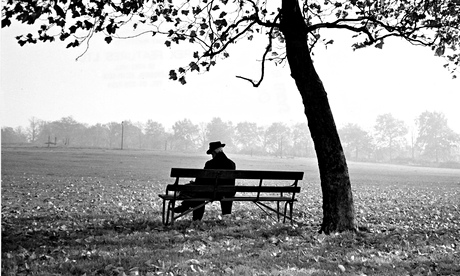
What do we call this time? It’s not the information age: the collapse of popular education movements left a void filled by marketing and conspiracy theories. Like the stone age, iron age and space age, the digital age says plenty about our artefacts but little about society. The anthropocene, in which humans exert a major impact on the biosphere, fails to distinguish this century from the previous 20. What clear social change marks out our time from those that precede it? To me it’s obvious. This is the Age of Loneliness.
When Thomas Hobbes claimed that in the state of nature, before authority arose to keep us in check, we were engaged in a war “of every man against every man”, he could not have been more wrong. We were social creatures from the start, mammalian bees, who depended entirely on each other. The hominins of east Africa could not have survived one night alone. We are shaped, to a greater extent than almost any other species, by contact with others. The age we are entering, in which we exist apart, is unlike any that has gone before.
Three months ago we read that loneliness has become an epidemic among young adults. Now we learn that it is just as great an affliction of older people. A study by Independent Age shows that severe loneliness in England blights the lives of 700,000 men and 1.1m women over 50, and is rising with astonishing speed.
Ebola is unlikely ever to kill as many people as this disease strikes down. Social isolation is as potent a cause of early death as smoking 15 cigarettes a day; loneliness, research suggests, is twice as deadly as obesity. Dementia, high blood pressure, alcoholism and accidents – all these, like depression, paranoia, anxiety and suicide, become more prevalent when connections are cut. We cannot cope alone.
Yes, factories have closed, people travel by car instead of buses, use YouTube rather than the cinema. But these shifts alone fail to explain the speed of our social collapse. These structural changes have been accompanied by a life-denying ideology, which enforces and celebrates our social isolation. The war of every man against every man – competition and individualism, in other words – is the religion of our time, justified by a mythology of lone rangers, sole traders, self-starters, self-made men and women, going it alone. For the most social of creatures, who cannot prosper without love, there is no such thing as society, only heroic individualism. What counts is to win. The rest is collateral damage.
British children no longer aspire to be train drivers or nurses – more than a fifth say they “just want to be rich”: wealth and fame are the sole ambitions of 40% of those surveyed. A government study in June revealed that Britain is the loneliness capital of Europe. We are less likely than other Europeans to have close friends or to know our neighbours. Who can be surprised, when everywhere we are urged to fight like stray dogs over a dustbin?
We have changed our language to reflect this shift. Our most cutting insult is loser. We no longer talk about people. Now we call them individuals. So pervasive has this alienating, atomising term become that even the charities fighting loneliness use it to describe the bipedal entities formerly known as human beings. We can scarcely complete a sentence without getting personal. Personally speaking (to distinguish myself from a ventriloquist’s dummy), I prefer personal friends to the impersonal variety and personal belongings to the kind that don’t belong to me. Though that’s just my personal preference, otherwise known as my preference.
One of the tragic outcomes of loneliness is that people turn to their televisions for consolation: two-fifths of older people report that the one-eyed god is their principal company. This self-medication aggravates the disease. Research by economists at the University of Milan suggests that television helps to drive competitive aspiration. It strongly reinforces the income-happiness paradox: the fact that, as national incomes rise, happiness does not rise with them.
Aspiration, which increases with income, ensures that the point of arrival, of sustained satisfaction, retreats before us. The researchers found that those who watch a lot of TV derive less satisfaction from a given level of income than those who watch only a little. TV speeds up the hedonic treadmill, forcing us to strive even harder to sustain the same level of satisfaction. You have only to think of the wall-to-wall auctions on daytime TV, Dragon’s Den, the Apprentice and the myriad forms of career-making competition the medium celebrates, the generalised obsession with fame and wealth, the pervasive sense, in watching it, that life is somewhere other than where you are, to see why this might be.
So what’s the point? What do we gain from this war of all against all? Competition drives growth, but growth no longer makes us wealthier. Figures published this week show that, while the income of company directors has risen by more than a fifth, wages for the workforce as a whole have fallen in real terms over the past year. The bosses earn – sorry, I mean take – 120 times more than the average full-time worker. (In 2000, it was 47 times). And even if competition did make us richer, it would make us no happier, as the satisfaction derived from a rise in income would be undermined by the aspirational impacts of competition.
The top 1% own 48% of global wealth, but even they aren’t happy. A survey by Boston College of people with an average net worth of $78m found that they too were assailed by anxiety, dissatisfaction and loneliness. Many of them reported feeling financially insecure: to reach safe ground, they believed, they would need, on average, about 25% more money. (And if they got it? They’d doubtless need another 25%). One respondent said he wouldn’t get there until he had $1bn in the bank.
For this, we have ripped the natural world apart, degraded our conditions of life, surrendered our freedoms and prospects of contentment to a compulsive, atomising, joyless hedonism, in which, having consumed all else, we start to prey upon ourselves. For this, we have destroyed the essence of humanity: our connectedness.
Yes, there are palliatives, clever and delightful schemes like Men in Sheds and Walking Football developed by charities for isolated older people. But if we are to break this cycle and come together once more, we must confront the world-eating, flesh-eating system into which we have been forced.
Hobbes’s pre-social condition was a myth. But we are entering a post-social condition our ancestors would have believed impossible. Our lives are becoming nasty, brutish and long.
Saturday, 23 August 2014
The secrets of long-term love
What is the key to a happy marriage? Is there a formula for long-term love? And how do you keep the passion alive after more than 50 years together? Six happily married couples share their secrets, from never eating in front of the television to keeping some things a mystery
- Hannah Shuckburgh
- The Guardian,
Together for 56 years
Gem, 74, and Ezra Harris, 74, grew up in Glengoffe, a village in St Catherine, Jamaica. Ezra emigrated to England at 19, Gem followed him two months later, and they married in August 1958. They settled in Bradford. Ezra was a forklift driver and Gem worked in domestic service until they both retired. They have three children, Jennifer, 55, Christopher, 52 and Samantha, 45, and four grandchildren.
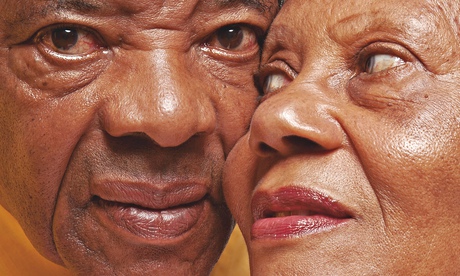 Ezra and Gem Harris: ‘ We have a good time. We used to love a dance, listen to reggae, calypso. But it’s hard now with our bad knees.’ Photograph: Bohdan Cap for the Guardian
Ezra and Gem Harris: ‘ We have a good time. We used to love a dance, listen to reggae, calypso. But it’s hard now with our bad knees.’ Photograph: Bohdan Cap for the Guardian
Ezra: Back home, people used to talk about abroad as if the whole place was paved with gold. When a plane passed overhead we would all look up and wish we were on it. One day I heard an advertisement on the radio, saying you could come to Britain and get work. It was a promise of a future. I wanted to make myself better off and be somebody.
I arrived in Bradford in June. It was supposed to be summer but I can remember the cold, the smell of the coal. The first day I was here, I felt like going back. You feel lonely; you miss your parents. I thought it would be much easier if I got a wife.
Gem had been two years below me in church school. I didn't know anything about women. My father was a preacher and very strict. I wrote to her saying I'd like to send for her to come and marry me. I hoped she'd agree and she did – she was glad to come because I bought her a ticket out of Jamaica. I knew she would make a good wife.
We didn't go back to Jamaica until 1973. Everything seemed different – smaller, farther away. It didn't feel like home. But still, after all this time, I can't get shot of my accent. Gem always tells me, "Speak English!" But you cannot teach an old dog new tricks.
Fifty-six years we have been married. You must work at it. Talk to each other. Disagree, but don't let arguments drag on. Don't go around having lots of kids with women and not looking after them. And believe in God. If you trust in Him, everything is going to be all right.
I try to be a good husband. I try not to come in with mucky hands. She worries about me passing first, and I tell her, "Don't worry about a thing." But if she goes first I will be miserable.
We're going to go on a cruise, and when I booked it the lady asked if we would like separate beds. I said, "What are you talking about, woman?" We are husband and wife. Sometimes you still get some fun!
Gem: I remember looking down from the plane as I flew into England for the first time, and seeing all this smoke coming from the chimneys. It looked as if the whole place was on fire.
Even now, I don't know how I managed to get to Bradford alone. Ezra didn't come to meet me at the station – I am still angry with him about that – so I got a taxi to his lodgings. It was just a room, really, with a coal fire and a paraffin heater.
I'd brought a wedding dress from home, and my mother's veil. I arrived on 12 August, and we married on 30 August in a register office. I missed my family very much at first, but you get used to it. The winters were hardest.
There was a lot of racism back then. People would shout, "Go back to your dirty country!" They treated you as though you were nothing. It was hurtful, but you just try to keep away from trouble.
Ezra calls me "the wife", which he shouldn't do. I'll tidy up the house and he'll go and leave crumbs. We quarrel every day, but we always make up.
He likes to cuddle, but I don't bother. I am always telling him to talk properly, but when I get mad, I talk in patois: "Shuttup and come dung ere, man!" He just laughs.
We have a good time. We used to love a drink and a dance at the African-Caribbean centre, listen to some reggae, some calypso – but it is upstairs and it's hard to get up there now with our bad knees. On Sundays I'll always cook Jamaican food for the family – curried goat, rice and peas, but always with yorkshire pudding, too.
Together for 52 years
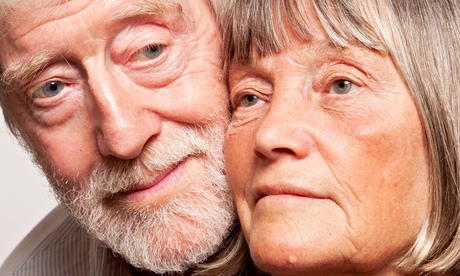 Mick and Barbara Wilson: ‘ I know many couples can’t survive such loss, but we could always talk and cry together.’ Photograph: Bohdan Cap for the Guardian
Mick and Barbara Wilson: ‘ I know many couples can’t survive such loss, but we could always talk and cry together.’ Photograph: Bohdan Cap for the Guardian
Barbara, 72, and Mick Wilson, 79, met in 1960 and married in 1962. Their eldest daughter, Sarah, died in a white-water rafting accident 14 years ago in Peru, when she was 36. Barbara is a neuropsychologist; Mick is a retired English teacher, and they live in Bury St Edmunds. They have two surviving children, Anna and Matthew, and four grandchildren.
Barbara: I was in my first year at teacher-training college when Mick, in the year above, invited me to his room for coffee. "Mick Wilson never invites people for coffee," a friend told me. He gave me a large German beer mug full of Nescafé; I think he wanted to make a good impression.
Mick thought we should wait to have children, but I decided we shouldn't. We were hippies: no TV, no car, we made our own bread. Mick had long hair and a beard and wore bell-bottoms. We had lots of cats and stick insects. I was a housewife, but Mick wanted me educated. I took my psychology A-level when I was 29, then a degree, a master's, and a PhD.
In 2000, I was leaving work when a colleague said, "Mick's on his way over." I just knew something awful had happened. Maybe it's the cat, I thought. Please let it be the cat. Mick called from the motorway. "There's terrible news." Some part of me already knew. "Is it Sarah? Is she dead?" He said, "I think so."
We somehow got through that night. Some kind of madness takes over. It's anguish, grief and everything in between. We took turns to be strong, I think. We talked and cried and held each other. We arranged to go out to Peru the following week and Mick paid £10,000 for a helicopter to look for Sarah's body. It was pointless, of course, but I knew he needed to do it, so I let him. Sarah has never been a taboo: we talk about her every day.
Mick: It was always a strong marriage. We've done daft things, of course. Back in the old, hippy days we thought we wanted an open marriage, but we tried it once or twice and it didn't work out for us. It taught us both that the best kind of arousal comes through affection, not sex with just anyone.
Our daughter Sarah's marriage had broken down after years of failed fertility treatments and she went to Peru to rethink her life. To this day, we've never had a body to bury. We won't ever have closure. You can learn to live with it, but you'll never close the book. I know many couples find their relationship can't survive this kind of loss, but ours did because we could always talk to each other and cry together.
We are in our old age now and, the way we see it, we've lived a happy life, apart from one terrible tragedy. We have two wonderful children, and four grandchildren. To have the marriage we have, the life we have together, I think we've been very privileged.
Together for 36 years
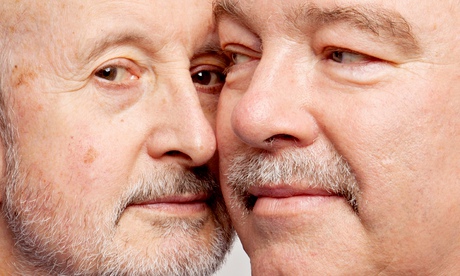 Howard Shepherdson (left) and Rod Marten: ‘ We have no separate lives. We spend every day together and it never gets boring.’ Photograph: Bohdan Cap for the Guardian
Howard Shepherdson (left) and Rod Marten: ‘ We have no separate lives. We spend every day together and it never gets boring.’ Photograph: Bohdan Cap for the Guardian
Rod Marten, 71, and Howard Shepherdson, 60, met in a pub in London in 1978. Rod is a retired tax inspector; Howard is a semi-retired management consultant. They were the UK's first same-sex couple to be legal long-term foster parents; their son, Glen, is 43. Rod and Howard have two grandchildren, and have been civil partners since 2005. They live in Ealing, west London.
Howard: I had always thought the idea of love at first sight was a cliche. But one Thursday night in 1978, that's what happened. I spotted Rod at the bar and it was just lovely from the moment we started chatting. I went home to my parents in Sussex that weekend feeling quite delirious. I thought, "What is this?" It was like catching pneumonia.
In 1985 I was a school counsellor and had been working with a 14-year-old boy, Glen, from a children's home. One day, Glen just asked me: "Will you be my dad?" I thought it was best to be honest with him, so I said I was afraid it was impossible, because I'm gay. Glen said, "Why should that matter?" And it struck a chord. Rod and I decided we might as well try. No gay couple had formally adopted – or long-term fostered, as we did – before. It was very strengthening, loving someone together and them loving you back. He now lives in France with his wife, Isabelle. We visit all the time, and Skype. Having grandchildren has been a deeply enriching experience for us.
Rod and I are not at all independent of each other. We have no separate lives. We spend every day together and it never gets boring. Yes, sex does start to slow down at our age, but physical intimacy shouldn't. We still curl up on the sofa together, as we have done for ever. There's just one thing we avoid completely as it would mean instant divorce – DIY.
Rod: When I went into work the day after I'd met Howard, a colleague said I seemed different, extra-happy. I was. We met in September and by December we were looking to buy a flat together. I think my family thought it was a bit soon, but we're still in the same flat, 36 years later.
In the 80s, being openly gay on the street was not something you felt particularly secure doing. We've never walked around holding hands. If we were 21 now we'd do it, but you can't just start doing that in your 60s. Getting our civil partnership was a political statement, but as the date got closer, it felt very romantic.
I think relationships need rules. Work must never dominate your life. We never go to sleep on an argument. I am a terrible procrastinator, and Howard is an over-organiser, but you have to learn to love the other person for who they are, and not be frustrated by what you want them to be. It's no good being perpetually disappointed. Our other absolute rule is that we never, ever eat dinner in front of the television. We haven't done it once in 36 years.
Together for 40 years
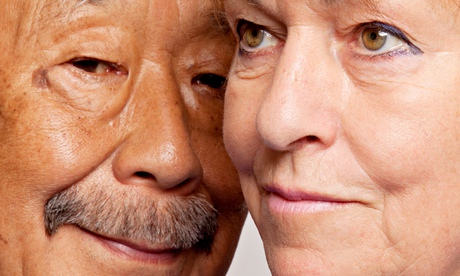 Setsuo Kato and Jill Fanshawe Kato: ' We’ve both had admirers over the years, but we have got strong self-discipline.’ Photograph: Bohdan Cap for the Guardian
Setsuo Kato and Jill Fanshawe Kato: ' We’ve both had admirers over the years, but we have got strong self-discipline.’ Photograph: Bohdan Cap for the Guardian
Jill Fanshawe Kato, 68, and Setsuo Kato, 72, met in London in the early 70s and married in Tokyo in 1974. They spent two years living in Japan before moving back to the UK and settling in north London. Setsuo is a freelance photojournalist; Jill is a potter.
Jill: I had visited Japan in my 20s and found it a very chauvinistic place. But I'd got quite far with my Japanese and wanted to carry on learning, so I joined an evening class in Holborn. Setsuo turned up one night to interview students for an article that he was writing.
Luckily for us, our families were very supportive. We had a traditional Japanese wedding in Tokyo. I wore a pink kimono with kanzashi hair ornaments.
I think after all these years together, I have started looking a bit Japanese. I've always used kohl round my eyes, and I like to wear Japanese textiles. I suppose it's attitude and behaviour, too. I'm from Devon, but British people can never tell where I'm from.
We never had children – perhaps that is the thing that has kept us together, and given us greater independence. We've both had admirers over the years, but we have got strong self-discipline. You need to be kind to each other, remember the value of what you have.
There should always be an unknown area of your partner. There is a lot of mystery about Setsuo. We would never go to the loo in front of each other; there is privacy and respect between us. We've lived in this house for more than 30 years, but Setsuo has never once gone into my studio at the top of the house. We are probably still finding things out about each other, even now.
Setsuo: Japanese men who travelled to London in those days were not mainstream – we were adventurous types. It wasn't as if you just hopped on a plane. I'd caught a Russian boat from Yokohama, and took the Siberian railway all the way to London.
I have lived here a long time, but I always consider myself Japanese. I am not very good at being physically affectionate. I am a bit better at it than most Japanese men, but I don't talk about my feelings. I don't lose my temper.
Jill and I give each other huge freedom. Jill will often go abroad for a month or two to work, and I enjoy a social life more than her – I zoom off and come back as I wish. We've always said we face the world back to back.
I think you have to be patient. When life is down, people think changing partners will help – but I'm not convinced anyone is better off in the long run. It would just be awful to have to start again.
We are like two trees that have grown together; our roots are entwined.
Together for 59 years
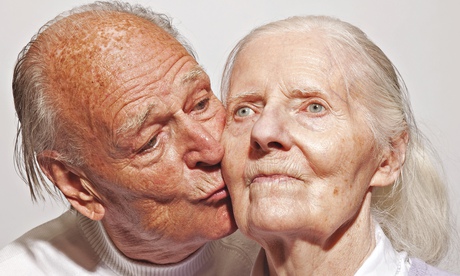 Patrick and Doreen Skilling: ‘ We married at the Savoy, way above our station.' Photograph: Bohdan Cap for the Guardian
Patrick and Doreen Skilling: ‘ We married at the Savoy, way above our station.' Photograph: Bohdan Cap for the Guardian
Doreen, 89, and Patrick Skilling, 86, married in 1955. They lived in Notting Hill for 50 years; Patrick was an advertising executive and Doreen designed wallpaper for Biba. In the 70s, the couple gave up their jobs to run a furniture stall together in Portobello Market. Doreen was diagnosed with Alzheimer's in 2006 and they now live together at the Sunrise care home in Beaconsfield.
Patrick: A colleague had been trying to take Doreen out. He said to me, "Take this bird out, will you? I can't handle her." So I took her for a drink. I was wildly impressed. We dated for five years and were married in the Queen's Chapel at the Savoy. It was way above our station, but Doreen somehow managed it.
We always thought we would have children, but by the time we realised it probably wasn't going to happen, it was too late. We weren't sad about it at the time – it wasn't something we even talked about – but now I think it may have been the greatest tragedy of our lives. When I see Doreen cuddling a doll now, I wonder whether it may have affected her more than she let on, that there might be a deeper sense of loss.
I was earning good money in advertising, smoking and drinking too much. I'm sorry to say I failed her many times; falling into the pitfalls that husbands do. But Doreen was always very patient. We decided I'd leave my job and we'd become business partners. So we took a stall in Portobello Market, and started selling antiques and junk furniture. It revitalised our married life. We had time to talk.
Ten years ago, I started to notice Doreen was having problems with numbers. She couldn't sort out the change. It was two years before we got a diagnosis, that she had Alzheimer's. She has never really understood what is happening to her. The change in her was slow and almost imperceptible. But I wept for her. It was so dreadful that such a lovely person should face such a thing.
All along I'd assumed we'd stay at home. But after six years, she developed problems I just couldn't cope with. She moved into a home, and for two months I visited her every day. It was obvious from day one that I should live there, too. I wanted to continue being important in her life. Selling our house was like losing another partner. You mourn for these things, as if they were human; the conservatory full of plants we'd tended together, all her paintings.
Doreen lives on a secure wing, and I have a separate room. She doesn't communicate at all now. She sits around looking lovely. I envy her tranquillity. I go up every day. She doesn't know it's me – Pat, her husband – but I think she thinks I'm a friendly face. That's good enough for me. I just cherish what's left.
Now I must fill my days. I walk, garden, do my stamp albums. I don't want to sit slumped on a chair, like everyone else here. And Doreen, she'll just fade away. She won't be afraid of it. But I'll be shattered. Inertia will probably keep me here after she's gone. I am 86, and it's just too daunting to find a new house. But you live day by day. It's hard to live any other way.
Together for 73 years
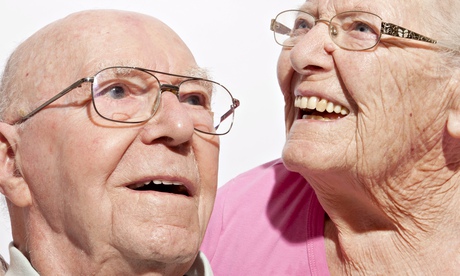 Fred and Gladys Croft: ‘ It will come some day, life without each other. We don’t like to think about it’ Photograph: Bohdan Cap for the Guardian
Fred and Gladys Croft: ‘ It will come some day, life without each other. We don’t like to think about it’ Photograph: Bohdan Cap for the Guardian
Gladys, 100, and Fred Croft, 96, met at a dance in New Malden, south-west London, in 1931. Gladys was a factory worker; Fred an engineer who then joined the air force. They married in 1940, before Fred was posted abroad. After the war, Fred worked for the NHS, and the couple settled in the London suburbs. They have a daughter, Audrey, 69, and a grandson, Iain, 41. They live in couples' accommodation in the Acacia Mews care home in St Albans.
Gladys: My mother died of an asthma attack when I was 18, and my father remarried and went off with his new family. He paid our rent, but we never saw him again. My youngest sister was only eight, so we had to bring ourselves up – five sisters in a small flat in Raynes Park.
I would go out with the girls I worked with at the weekend. We'd always have a good laugh. That's where I saw Fred for the first time, at a dance. I loved dancing back then.
We got married just before he left for the war and I wore a wedding dress that three of my sisters had already worn. We didn't have many guests, just my sisters and Fred's mum, who had made a fruitcake.
I didn't want children during the war, because so many fathers didn't come back, you see. You can't think the worst, but my sister's husband was killed in the war – terribly sad.
Audrey was born in May 1946. It was too late to have any more children, because I was so old – 32. We decided that we wouldn't have any more.
We've had some wonderful holidays. Fred would often surprise me by booking a hotel for the weekend. We both love seeing places – Denmark, Spain, Ireland – but we'd never take a package tour. We liked to do it ourselves, see a lot of things.
We don't get flustered; I think that's the secret. Fred is very easy-going. He'll go into the garden and I'll leave him be. He has been a good husband, and I think I've been a good wife.
We haven't had difficult times or problems like many other people have – we've had good health, nice holidays, and we've worked hard. We've done everything together, and always had each other. We've never been lonely. I have never been unhappy in all my life. You have to make your own pleasures, don't you?
Fred: There's nothing magical about it, really. We've just lived a normal life. If you've got problems, you sort them out. We have arguments, but we've never had a row. Not a proper one.
Yes, there are things we would have liked to have, but if we couldn't afford it, we didn't buy it. We never bought a house. Borrowing money makes for trouble. I've met two people in my life with plenty of money and they've never been happy. Money causes terrible worries for people.
The things you saw in the war, they shaped you. These days, youngsters don't seem satisfied with life. They think nothing of getting married three times. Our grandson, Iain, is divorced. I think you've got to try to be happy with what you have. Don't always be looking elsewhere. Don't aim for the moon.
I've always let Gladys do what she pleased. If she wanted to go out with the girls, she just went. I didn't worry. But I've always included her in my interests, that's the thing. I love boats, and we had wonderful barge holidays together for 30 years.
It'll come some day, life without each other. We don't like to think about it. Gladys gets panic attacks. I can't stand up on my own any more, so I can't help her. It's terrible to watch. I wouldn't want to be without her.
Wednesday, 24 July 2013
Australian Cricket: hubris, despair, panic
Clarke and Co find themselves where England were in the 1990s. But how did the two nations fall into such a state?
Ed Smith
July 24, 2013
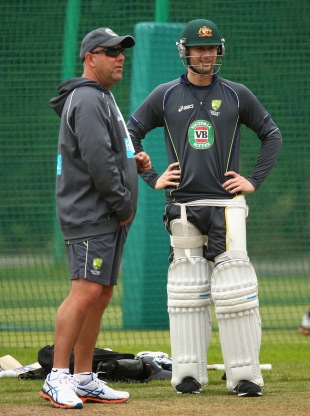
| |||
Related Links
Players/Officials: Michael Clarke | Darren Lehmann
Series/Tournaments: Australia tour of England and Scotland
| |||
I have been watching Michael Clarke, but the shadows I see following him around - to my eyes, anyway - resemble the ghosts of old English nightmares.
When Clarke stood at slip on the third day at Lord's, with the match over as a contest but unmercifully drawn out as a spectacle, he experienced what every captain dreads. He could move the deckchairs, but the boat was sinking. He could change the bowling, but it would be determined by a sense of fairness and sharing the burden rather than to swing the match; he could set new fields, but more to protect pride rather than ensnare opponents; and, worst of all, he had to weigh up how fully to engage in captaining the fielding effort, and how much emotional energy to preserve for when his turn to bat came around. Captaining the team, captaining your own mood, managing defeat, managing the draining away of hope.
I bumped into Mike Brearley during the long afternoon slaughter and we agreed: no captain, so far behind in the match and still awaiting a slim chance to save the match with his own bat, can captain flat out in the field all day. He inevitably dips in and out of full engagement, the long spells of routine steadiness in which he preserves emotional energy interspersed with shorter bursts of activity and invention designed partly just to keep up his own sense of interest and alertness. And what emotional outlook should you adopt? Is it easier to retain optimism and be perpetually let down? Or better to accept the inevitable, release the burden of pretence, and just wait to bat with coolly detached precision?
And that is why the shadows looked so English to my eyes. I thought of Michael Atherton and Nasser Hussain, hurling their considerable competitiveness and intelligence at the effort to win the Ashes - pick any moment you like, really, between 1993 and 2002-03 - and ending up exhausted, holding a losing hand of cards, looking within once again, wondering how much more they still had left to give when called upon to bat.
Clarke, when the series is over, will doubtless seek honest conversations with men who have experienced similar suffering. Ironically, the opposition coach, Andy Flower, knows more than most about how to retain exceptional standards while playing for an inferior team.
All of which leads me to the central point: if you are interested in leadership (and I have never met a sports fan without strong opinions about captains, managers and selectors) then you have the obligation to be equally interested in context. Sport, like political analysis, suffers from the recurrent delusion that great leaders can change everything about their circumstances, that they can engineer a new reality out of will power and charisma alone. They cannot.
Just think how beside the point the analysis of Darren Lehmann's character and personality now sounds. It is the same Lehmann - with the same sense of fun and enjoyment, the same sharp cricketing brain, the same mischievous enthusiasm. All of which is being applied to the same tendency of Shane Watson to get lbw, the same Phillip Hughes weakness against spin, the same holes at the top of the order, the same shortage of new cabs on the rank. No coach can solve all those problems in a few weeks. So it is largely irrelevant to analyse the strengths and weaknesses of the man currently trying to do so. Mickey Arthur is suing Cricket Australia for damage to his reputation. Perhaps he should be sending them a cheque and a letter of thanks for preserving it.
So let us leave behind the soap opera, the tidbits of gossip and intrigue. No causal truths reside there. What David Warner's brother thinks of Shane Watson did not lose Australia the Test match, nor did the sacking of Arthur, nor homework-gate, nor an incident in a nightclub, nor even an alleged rift in the team. There was, in fact, no news from Lord's. Old failings, long present, were simply exposed in a clearer light.
Players, they are the problem; performance, that is the flaw; culture, that is the cause.
Before the 2010-11 Ashes, I suggested that the pillars of Australian excellence - club cricket, state cricket, and a hard-bitten unified cricketing culture that ran through their game at all levels - had crumbled. One firm push and the citadel might fall. I first put my theory to a distinguished former England captain. He didn't quite ridicule me, but he smirked at the idea that an enemy that had inflicted so much pain on him might now suffer structural decline. I deferred to his greater experience, cut short my conversational theorising, and steeled myself for print instead.
This is what I wrote in the Spectator on 20th November 2010:
The idea will not leave me alone. A sneaking question keeps coming into my head: are Australia losing their cricketing edge? And I don't just mean the Ashes. I mean the whole legend of the Aussie battler that has been constructed over decades of flinty toughness…[Once] self-reliance was as central as toughness. Rod Marsh's coaching advice was simple: "Sort it out for yourself." That spirit ran through the great tradition. Bradman taught himself to bat by hitting a golf ball against a wall with a stick. Learning to bat was another form of looking after yourself, like pitching a tent in the outback. That resilience was compounded by the sense that Australians had a point to prove, that the world too often underestimated them. Cricket was a means of getting even…I was brought up on the received wisdom that it was the Australian system that made them so tough - the strong club cricket, the fierce inter-state rivalries. Each has now declined, at least to some extent. It may be a very long time indeed - a full turn of the dynastic wheel - before Australia will again be able to boast such a record of dominance.
let us leave behind the soap opera, the tidbits of gossip and intrigue. No causal truths reside there. What David Warner's brother thinks of Shane Watson did not lose Australia the Test match, nor did the sacking of Arthur, nor homework-gate, nor an incident in a nightclub
Subscribe to:
Comments (Atom)
